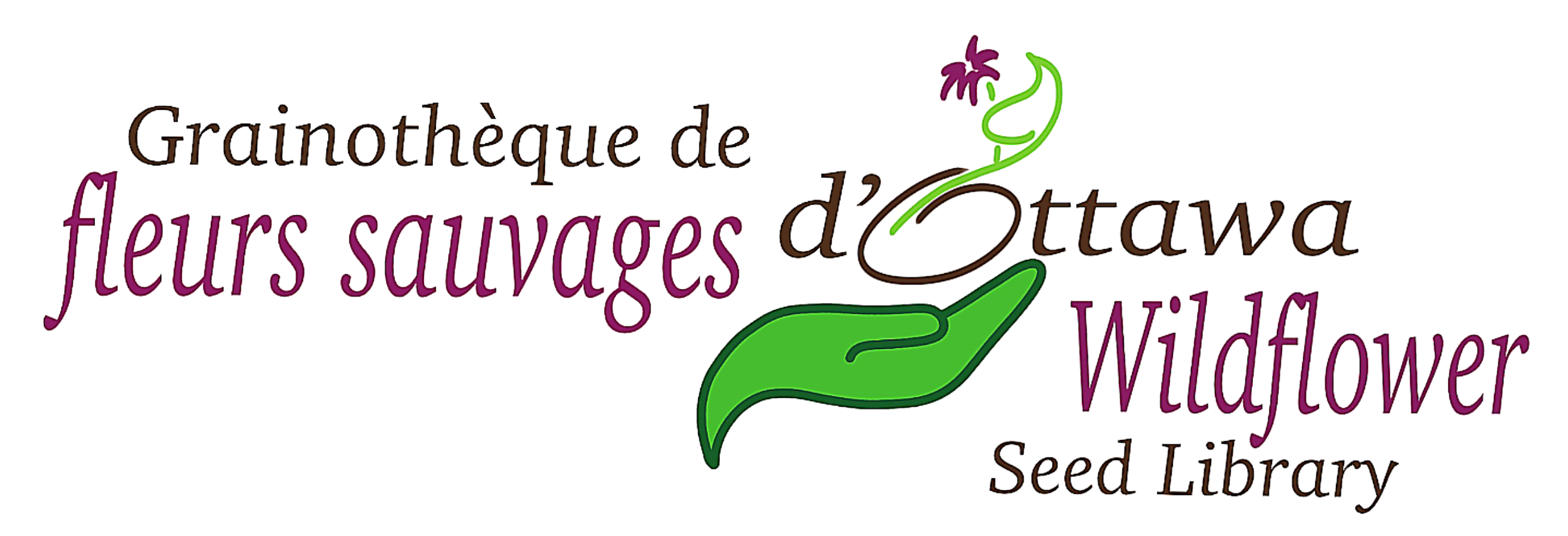When the Ottawa Wildflower Seed Library was founded in 2020, it was, to the best of our knowledge, the first seed library of its kind, offering strictly native seeds and plants. But across North America and elsewhere, we need more native seed libraries in order to lower the barriers to native plant gardening, protect genetic diversity and integrity, and to spread knowledge and awareness of native plant gardening in our communities.
Below, we share what tips and resources that have worked for us in establishing and growing the Ottawa Wildflower Seed Library in the hopes that it can inspire and guide others who wish to start their own native seed libraries in their local communities, whether big or small.
The Ottawa Wildflower Seed Library’s Chair and Founder, Mélanie Ouellette spoke about creating seed libraries in a David Suzuki Foundation webinar. The recording of the webinar is below.
Determine your guiding principles
Consider why you want to start a native seed library, what you want to accomplish, and in what way. For example, the Ottawa Wildflower Seed Library was started as a local way of combating climate change, and as an act of reconciliation. The principles that guide us in all our work are:
- Ethical: We harvest native seeds ethically, with permission from the owner, no plants taken from the wild, no seeds from the first nor last plant, and seeds taken from a large population of plants.
- Reciprocal: We work as a library, ‘checking out’ seeds and plants free of charge, and ‘checking in’ when donating seeds and plants.
- Empowered: this speaks to our desire to educate and share scientific information so that community members feel empowered to garden with native plants.
Resources:
- Ottawa Wildflower Seed Library’s Ethical Harvesting Policy
Use science as your guide
In establishing a native seed library, use just one resource to determine if a plant is native. For example, the Ottawa Wildflower Seed Library uses VASCAN, a peer-reviewed, collaborative database. This helps to prevent disagreement from various sources as to the native range of some plants.
Because a lot of native plant species have cultivars, you will also want to determine a process for identifying the source of plants to preserve genetic integrity and avoid introducing cultivars into your library’s inventory. Develop a list of ‘trusted sources,’ nurseries or plant stores that declare where their seeds or plants come from, and that they have been harvested ethically. When people donate seeds and plants to your library, make sure you ask them to identify where they got the plants and that they are only donating straight species.
Resources:
- VASCAN
- A short introduction to using VASCAN (video by Sundaura Alford Purvis)
- Ottawa Wildflower Seed Library’s list of trusted sources
- Seed and plant donation form
Start small
When starting a native seed library, start small. Focus just on sharing native, straight seeds at first. Take stock of what native plants and seeds are available to you. What native plants do you have in your own garden from which you could harvest and share or exchange seeds with others?
Second, consider what communication channels are available to you to make those seeds available to others. Local buy nothing groups on Facebook can be a good place to start. Consider starting a private Facebook group so that once you share seeds with people, there’s a way to stay in continued contact for future seasons and seed exchanges.
Resources:
Getting organized as you grow
As you have more people interested in donating and sharing seeds, Google docs can be your friend. Use Google docs to make a list of what seeds people are offering, and what seeds people are looking for. You may have volunteers to organize and task lists to manage in a Google Drive.
As you become more established, you may also want to develop policies and procedures for your library. The Ottawa Wildflower Seed Library invites you to adapt its policies to suit your purposes.
As you grow you may also wish to set up an organization. There is no need for formality, unless you have money or need to access large grants, in which case you’ll want to consider incorporating and/or registering as a charitable organization.
Resources:
- Ottawa Wildflower Seed Library’s Organizational Policies and Corporate Documents
Follow Mother Nature’s rhythm to determine what you do and when
In determining your library’s operational cycle, follow Mother Nature. Native seeds must go through freeze and thaw cycles in order to germinate and therefore people should have access to seeds in time for winter sowing. Harvesting seeds in summer and early fall provides the opportunity to distribute those seeds in the fall and early winter in time for winter sowing.
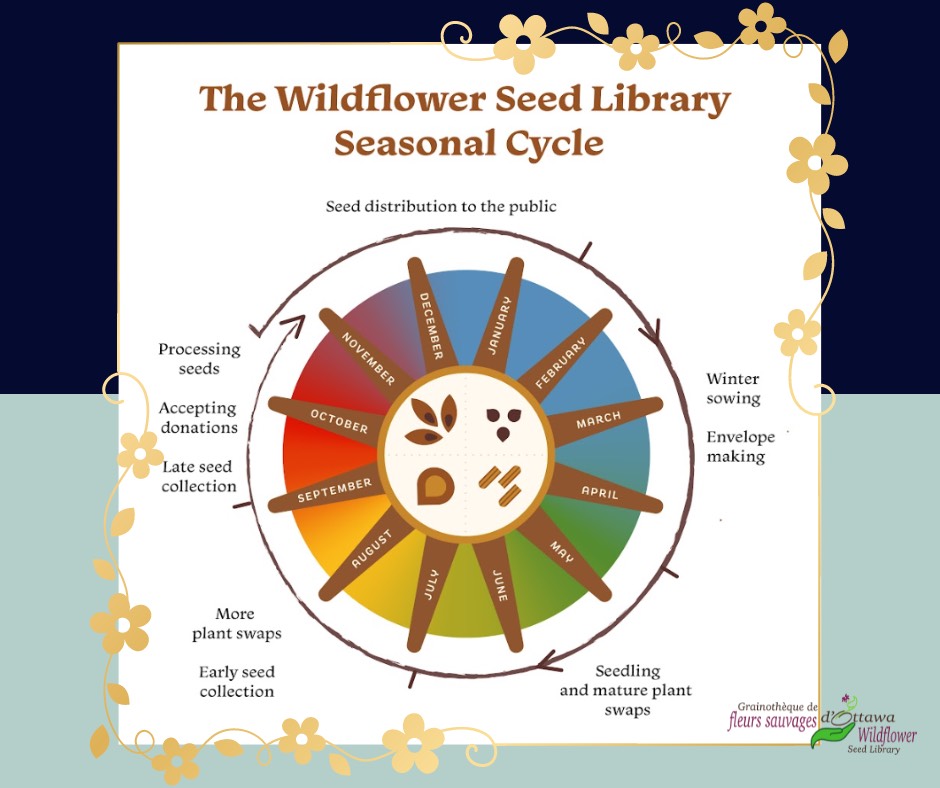
+ Fall: Collecting and packing seeds (click to expand)
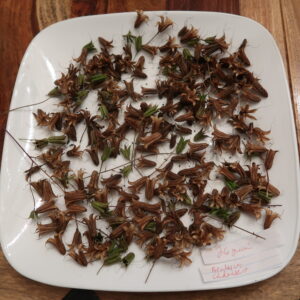
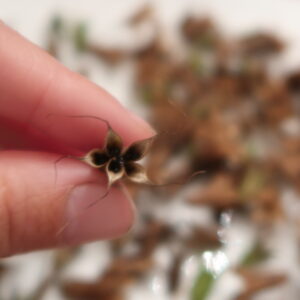
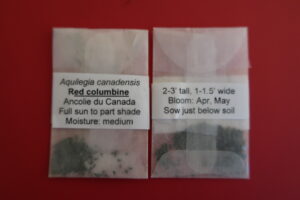
Provide clear and simple instructions so that your community can harvest and pack their own seeds. Don’t feel you have to reinvent the wheel: you are welcome to use and share the Ottawa Wildflower Seed Library resources for how to harvest and pack native seeds, including harvesting instructions by species, instructions for how to make paper envelopes out of recycled materials, instructions for measuring and packing seeds, and templates to label seed envelopes.
Also give community members a location to drop off seeds that they have harvested and are donating to the library. As your seed operation grows, you may wish to have a number of volunteers across your geographic area who can serve as coordinators and drop-off locations for seed donations.
Resources:
- How to harvest and pack native seeds, by species
- Seed packing instructions
- How to pack seeds that must be kept dried and at room temperature (video)
- How to pack seeds requiring to be kept moist and cold until sowing (video)
- How to make your seed envelopes (video)
- Seed envelope labels (by species)
- Instructions for local coordinators of seed-packing volunteers
- Matching seed donors, packagers, and drop-off
+ Fall: Storing and organizing seeds (click to expand)
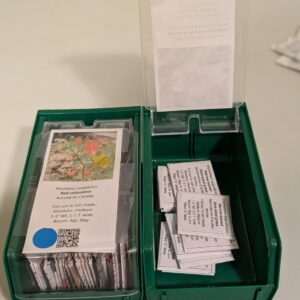
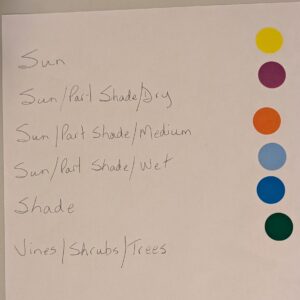
Unless specified for a particular species, store native seeds in paper envelopes. Keep the envelopes in a dry, cool spot to prevent molding. Optionally, you may want to use a dehumidifier and/or an air purifier in the area where you are storing seeds. If storing seeds longer term, seeds need to be fully dried before being frozen in an air-tight container that does not allow moisture in.
The Ottawa Wildflower Seed Library stores the seed envelopes in stackable plastic bins with lids. Each bin is labelled with the species name and information, and a colour-coding system for the light and soil conditions for which that species is best suited (sun, sun/part shade/dry, sun/part shade/medium, sun/part shade/wet, shade, and vines/shrubs/trees).
If there are more seed envelopes than fit in the bins, we store the excess envelopes in a sealable plastic bag.
Resources:
+ Fall: Seed packing events (click to expand)
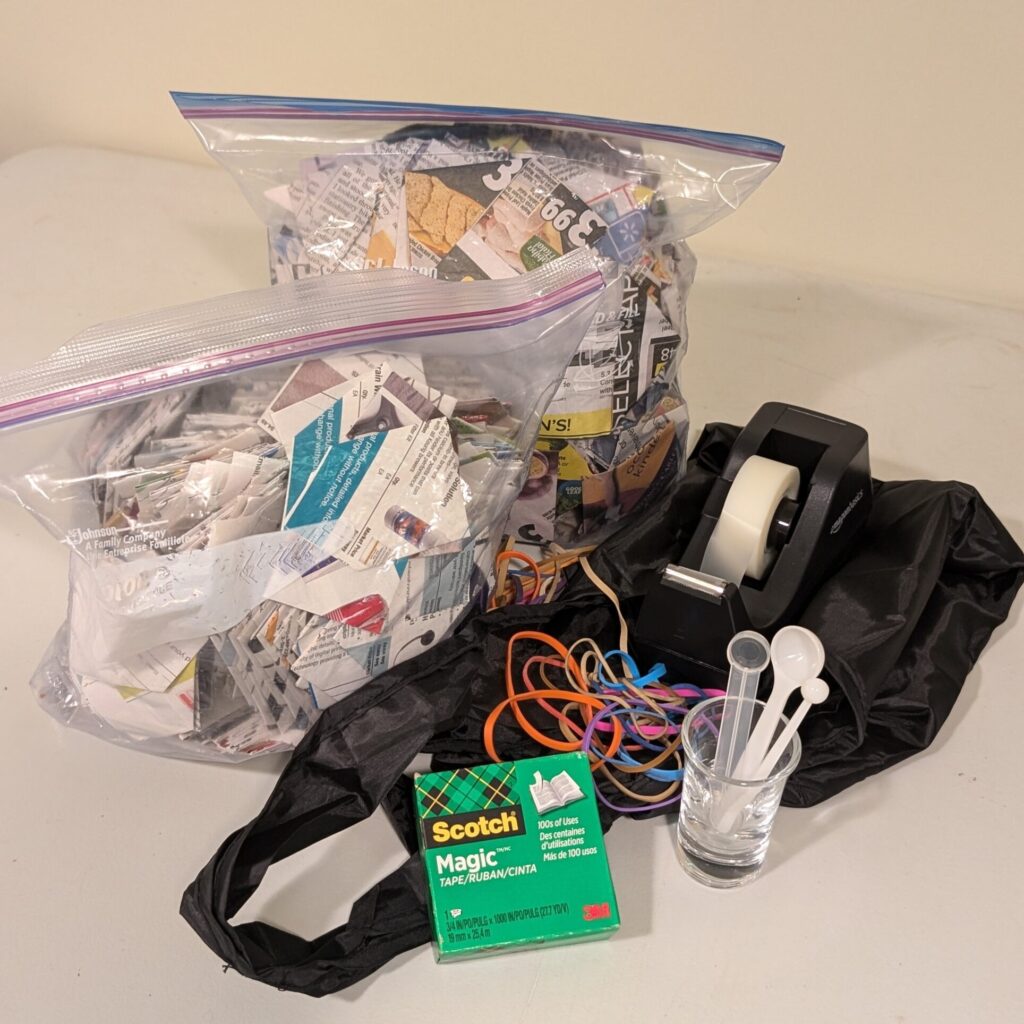
As your community grows and becomes more engaged, you may wish to host a seed packing event for people to pack seeds together. Find a space that is inexpensive and tell people to bring supplies: seeds, tape, labels, and containers.
Resources:
+ Fall: Seed giveaway events (click to expand)
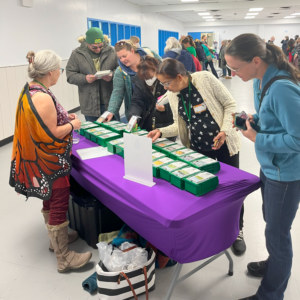
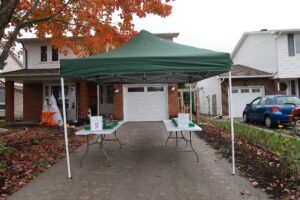
As you grow and have more and more people looking for and donating seeds, you may want to host an event on a particular day and time where people can attend to pick up seeds. When first starting out, these events can be hosted in garages or driveways or at a public park in your community. If you are servicing a larger geographic area, consider hosting a series of seed giveaway events in different neighbourhoods so that community members have an opportunity to attend an event at a convenient location for them.
As you grow and have more and more seeds to provide to a larger number of community members, consider hosting seed giveaway events in larger venues like community centres or libraries. This will involve event space rentals, and will likely require you to recruit volunteers to help set up and staff these events. We’d also recommend including a “how to winter sow” station at these events to provide guidance to people on what to do with the seeds once they take them home that will give them the highest chance of success.
Use your established communication channels to get word out about these events, and consider contacting local media, community newspapers, councilor newsletters. and like-minded organizations to promote the events and grow your audience.
Resources:
+ Winter: Winter sowing (click to expand)
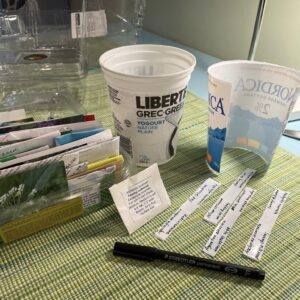
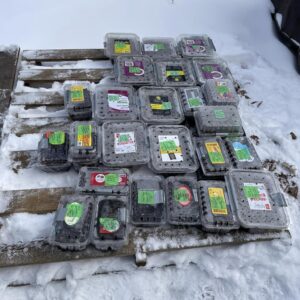
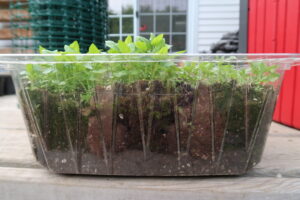
This presents the largest risk to native seed libraries: people not encountering success with sowing their seeds. Provide clear instructions (both in-person at seed giveaway events and in writing via a website, for example) for how to winter sow. The Ottawa Wildflower Seed Library has resources for winter sowing that you are welcome to share with your community. Key pointers are to place seeds in a location that faces north, east, or west, but not south-facing; keep soil moist, but not wet; and more shade is better than too much sun.
Resources:
- How to winter sow infographic
- How to winter sow (Ottawa Wildflower Seed Library YouTube playlist)
- Prairie Moon Nursery: Species Requiring No Pre-Treatment (Germ Code A)
- Introduction to transplanting and repotting seedlings (Ottawa Wildflower Seed Library YouTube playlist)
+ Winter and spring: Make paper envelopes (click to expand)
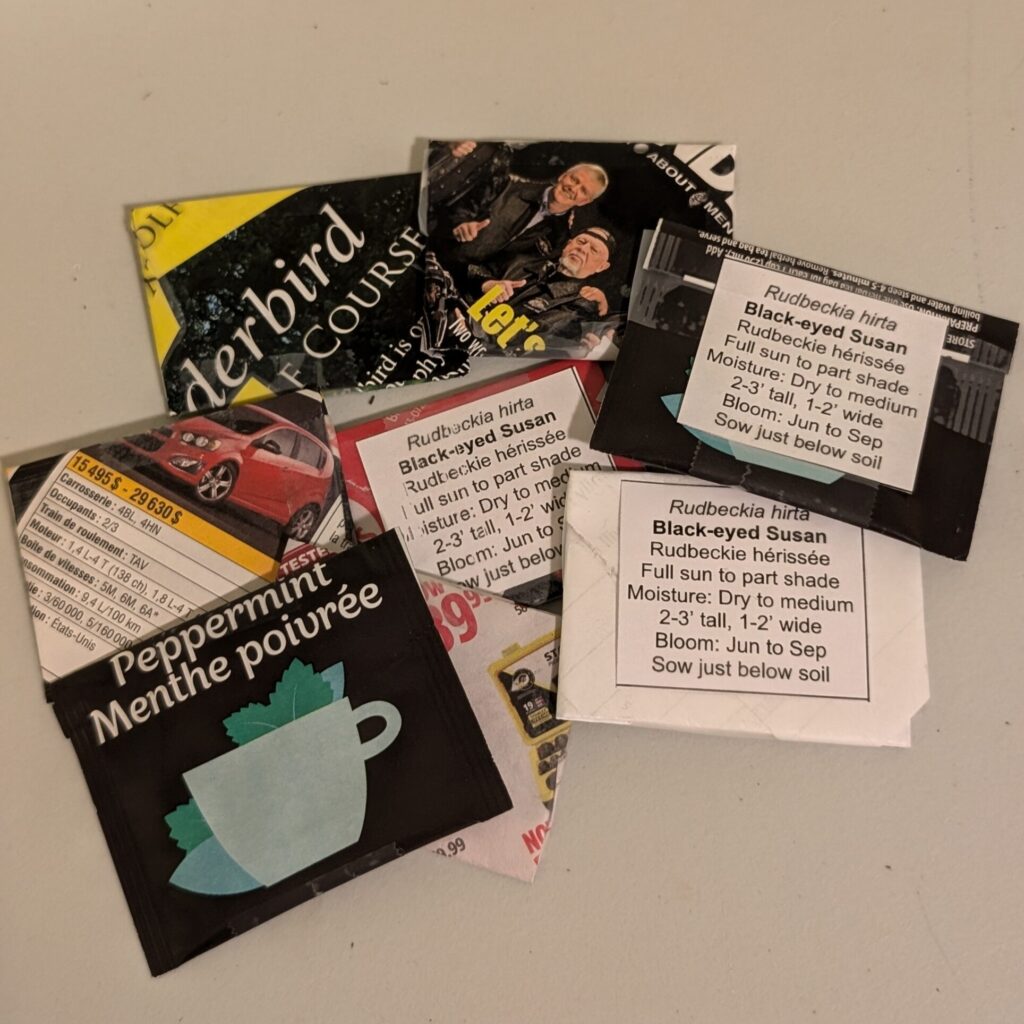
While seeds are germinating over the winter and spring, encourage your community members to make paper envelopes in preparation for the next seed harvesting season. Making envelopes can be an easy activity to do while watching tv, or you could host envelope-making events to bring people together and foster a sense of community.
Resources:
+ Summer: Sharing plants (click to expand)
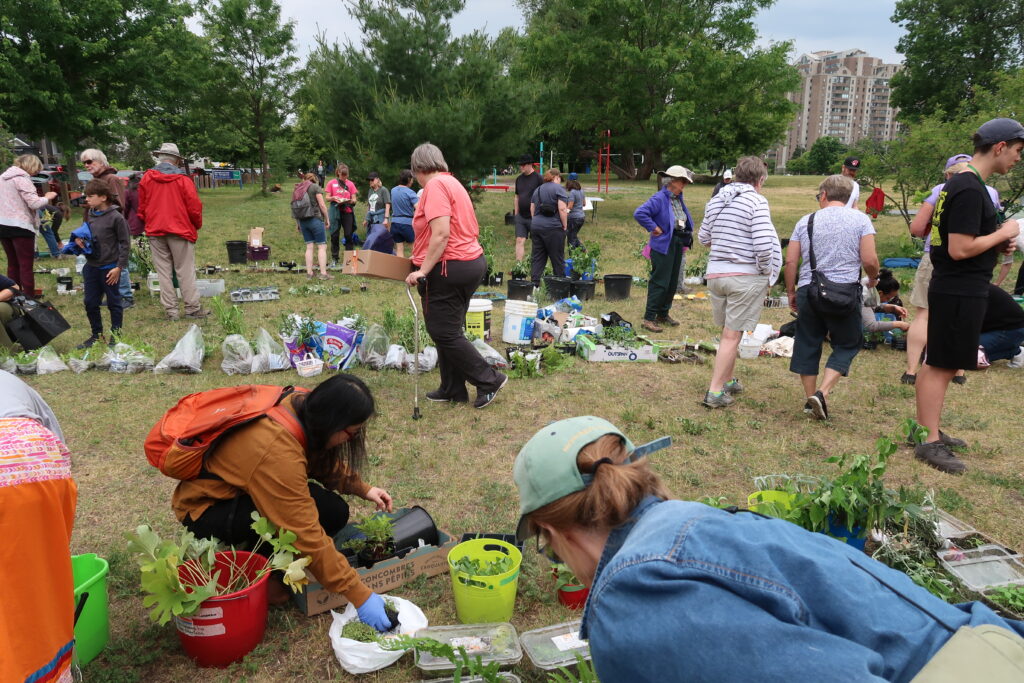
In the summer, as established plants grow and can be divided, or as people plant seedlings and realize they have extras, community members may wish to share plants with others in the community.
This can be done on an individual basis, using a Google doc to list what plants or seedlings people are looking to share, and which species people are looking to receive and to connect those donors and recipients.
Or, you may wish to host a plant giveaway event. Plant giveaways can be organized in a similar fashion as the seed giveaways: start small in garages, driveways, or public parks. As always, ensure that donors can attest to the source of the plants that they are donating and that they are straight species.
Resources:
How to raise awareness and communicate
As you are starting out, local buy nothing groups on Facebook can be a great way to spread word about exchanging native seeds. As you grow and develop a larger following, you may wish to establish a dedicated social media presence for your library. To foster a safe and productive community on your social media channels, such as a Facebook group, focus on science. Do not tolerate violent and unsafe comments. Try to create a community that focuses on practical solutions to problems. Depending on how active your community is online, you may need a few volunteers to serve as admins or to help manage your social channels.
You can also use more traditional forms of communication to promote your library and its work. For example, contact municipal councilors to inquire about including news about your seed giveaway events in their newsletters. Submit articles to community newspapers. Pitch stories to local media. Reach out to like-minded organizations in your area to ask for their help in promoting your events through their own communication channels (newsletters, social media, etc.)
A polished brand can help ensure that you and your library are taken seriously. As you grow, you may be approached–or you may wish to seek out opportunities!–to present to community organizations, schools, and other groups. These presentations and opportunities can help bring greater visibility to your library.
Resources:
- Infographics about native plant gardening
- Infographics about easy-to-grow native plants
- Infographics about native plant gardening in containers
- Photos of native plants, and animals, birds, and insects in native gardens (if using, please credit to Ottawa Wildflower Seed Library)
Recruit volunteers
Don’t be afraid to ask for help! Especially as your library grows and you begin hosting more and more events, there are more logistical considerations to ensure that everything comes together. Recruit a group of volunteers who can help package seeds prior to seed giveaway events, who can help set up and work these events, and who can help with other library tasks as required. Assign the right tasks to the right people, be sure to tell them how their tasks support the bigger picture, and be sure to set up time to celebrate and thank your team of volunteers on a regular basis.
Opportunities for growth: Donations
Even when trying to keep your financial costs to a minimum, as your seed library becomes established and grows, you will likely need some funding to cover operational costs such as containers to store seeds, event space rentals, event materials (tables, signage, etc.), website hosting, etc. Monetary donations present one potential source of funding (either by collecting them at in-person events, or accepting monetary donations through a website), as does merchandise. The Ottawa Wildflower Seed Library, for example, produced car magnets and lawn signs that are sold on our website and at all of our events. These bring in some funding, and also serve to promote the work of the library in the broader community.
